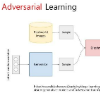The Adversarially Learned Mixture Model (AMM) is a generative model for unsupervised or semi-supervised data clustering. The AMM is the first adversarially optimized method to model the conditional dependence between inferred continuous and categorical latent variables. Experiments on the MNIST and SVHN datasets show that the AMM allows for semantic separation of complex data when little or no labeled data is available. The AMM achieves a state-of-the-art unsupervised clustering error rate of 2.86% on the MNIST dataset. A semi-supervised extension of the AMM yields competitive results on the SVHN dataset.
翻译:辅助学习混合模型(AMM)是未经监督或半监督的数据组合的基因模型。AMM是第一个模拟推断连续和绝对潜在变量之间有条件依赖性的对抗优化方法。对MNIST和SVHN数据集的实验表明,AMM允许在很少或没有标签数据的情况下对复杂数据进行语义分离。AMM在MNIST数据集上实现了2.86%的未经监督的最新组合错误率。AMM的半监督扩展在SVHN数据集上产生了竞争性结果。





